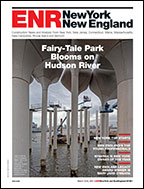The DEC’s report cited a variety of concerns in addition to water quality, which numerous critics have cited, including fracking-induced earthquakes, damage to visual sheds and tourism, disposal of fracking waste water, and increased ozone levels downwind of fracking sites.
The report also noted the high volume of comments, 260,000 in all, the vast majority of which were in favor of severely restricting or prohibiting fracking altogether.
Many of New York’s shale gas reserves are found in the state’s Southern Tier in a swath from the east-west Pennsylvania border to the edge of the Catskill Mountains, which is one of the primary watersheds for New York City.
From an environmental viewpoint, the DEC’s finding takes a tougher stance than a June 7 report from the Environmental Protection Agency that found fracking had not resulted in "widespread, systemic" damage to drinking water supplies despite some potential "vulnerabilities."
A DEC spokesman said state agency’s report was more comprehensive than the EPA’s.
In part bolstered by the EPA report, some fracking advocates and industry lawyers are studying the state’s finding and deciding whether or not to mount a challenge.



Post a comment to this article
Report Abusive Comment